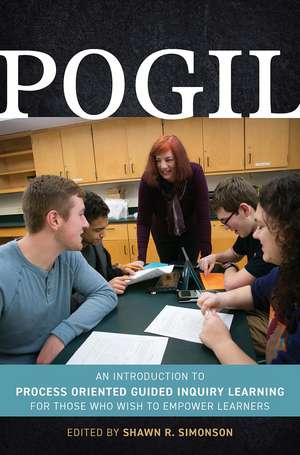POGIL: An Introduction to Process Oriented Guided Inquiry Learning for Those Who Wish to Empower Learners
Editat de Shawn R. Simonsonen Limba Engleză Paperback – 5 apr 2019
| Toate formatele și edițiile | Preț | Express |
|---|---|---|
| Paperback (1) | 349.58 lei 6-8 săpt. | |
| Taylor & Francis – 5 apr 2019 | 349.58 lei 6-8 săpt. | |
| Hardback (1) | 1005.94 lei 6-8 săpt. | |
| Taylor & Francis – 9 apr 2019 | 1005.94 lei 6-8 săpt. |
Preț: 349.58 lei
Nou
Puncte Express: 524
Preț estimativ în valută:
66.91€ • 72.71$ • 56.24£
66.91€ • 72.71$ • 56.24£
Carte tipărită la comandă
Livrare economică 21 aprilie-05 mai
Preluare comenzi: 021 569.72.76
Specificații
ISBN-13: 9781620365441
ISBN-10: 1620365448
Pagini: 350
Dimensiuni: 152 x 229 x 20 mm
Greutate: 0.45 kg
Ediția:1
Editura: Taylor & Francis
Colecția Routledge
Locul publicării:Oxford, United Kingdom
ISBN-10: 1620365448
Pagini: 350
Dimensiuni: 152 x 229 x 20 mm
Greutate: 0.45 kg
Ediția:1
Editura: Taylor & Francis
Colecția Routledge
Locul publicării:Oxford, United Kingdom
Public țintă
PostgraduateCuprins
Preface—Richard S. Moog, Marcy Dubroff, and Shawn R. SimonsonAcknowledgments Part One. Introduction 1. Not Just a Good Idea, POGIL Has a Theoretical Foundation—Christopher F. Bauer, Patrick L. Daubenmire, and Vicky Minderhout 2. Origins of Pogil. Process Oriented Guided Inquiry Learning—Richard S. Moog 3. PO. The Process—Renee Cole, Juliette M. Lantz, and Suzanne M. Ruder 4. GI. The Guided Inquiry—Regina (Gina. F. Frey and Susan E. Shadle 5. L. Learning—The Evidence —Stanley M. Lo, Jonathan I. Mendez Part Two. Implementing 6. Team Construction and Accountability—Megan Morgan Hoffman and Susan Richardson 7. Activity Selection and Writing—Clif Kussmaul and Mare Sullivan 8. Facilitation—Mare Sullivan and Jennifer Loertscher 9. POGIL in the Large Classroom—Sally Shaffer Hunnicutt, Suzanne M. Ruder, Katie E. Amaral, Ellen J. Yezierski, and Christopher F. Bauer 10. Assessment, Evaluation, Metacognition, and Grading in POGIL—Shawn R. Simonson 11. POGIL in STEM and Laboratory Classes—Steven Gravelle, Rob Whitnell, and Patrick J.P. Brown 12. POGIL Beyond STEM—Sue Joyner Guillaud and Margie Ruppel 13. What’s Next?—Richard S. Moog Appendices A. The POGIL Project B. Frequently Asked Questions C. Sample Activities Contributors Index
Notă biografică
Shawn R. Simonson is Director of the Human Performance Laboratory, Professor in the Department of Kinesiology, and Faculty Associate in Center for Teaching and Learning, at Boise State University. Dr. Simonson uses a variety of learner-centered pedagogies as he works to help students become independent learners. He has published in teaching and learning, exercise physiology, and environmental physiology.
Recenzii
"POGIL is a well-envisioned and superbly-executed volume. Initial chapters lay a comprehensive theoretical and empirical foundation for the POGIL approach. The following chapters provide an accessible scaffolding for implementing POGIL. The book is full of usable principles and informative examples for developing POGIL across a variety of STEM and non-STEM courses, even for large classes. This volume is a gem both for readers wanting an introduction to POGIL and for readers poised to initiate and improve their POGIL instruction."
Mark A. McDaniel, Co-Director, Center for Integrative Research on Cognition, Learning, and Education (CIRCLE)
Washington University in St. Louis
“This book is a must-read for every instructor interested in POGIL—whether they are already using the pedagogy in their classes, planning to use, or are just curious to learn about it. Although I have been familiar with this pedagogy and its founders for over 20 years I still found new ways of thinking about my own work as I read this book. I love the way it is organized!”
Pratibha Varma-Nelson, Professor, Department of Chemistry and Chemical Biology and Founding Executive Director, STEM Education Innovaiton and Research Institute
IUPUI
"This collected wisdom of the POGIL community is immense, reflecting both practical classroom strategies and strong ties to theoretical frameworks in science education, sociology, and the learning sciences. With origins in undergraduate chemistry education, the ideas contained in this guide are relevant to any instructor – in any discipline and at any cognitive level – who aspires to structure an engaging and equitable classroom environment that also challenges students to be architects of their own learning."
Kimberly Tanner
San Francisco State University
“A timely, comprehensive, and highly informative must-read for anyone interested in implementing active learning in their science, engineering, or mathematics undergraduate classrooms."
Chris Rasmussen
San Diego State University, Department of Mathematics and Statistics
Mark A. McDaniel, Co-Director, Center for Integrative Research on Cognition, Learning, and Education (CIRCLE)
Washington University in St. Louis
“This book is a must-read for every instructor interested in POGIL—whether they are already using the pedagogy in their classes, planning to use, or are just curious to learn about it. Although I have been familiar with this pedagogy and its founders for over 20 years I still found new ways of thinking about my own work as I read this book. I love the way it is organized!”
Pratibha Varma-Nelson, Professor, Department of Chemistry and Chemical Biology and Founding Executive Director, STEM Education Innovaiton and Research Institute
IUPUI
"This collected wisdom of the POGIL community is immense, reflecting both practical classroom strategies and strong ties to theoretical frameworks in science education, sociology, and the learning sciences. With origins in undergraduate chemistry education, the ideas contained in this guide are relevant to any instructor – in any discipline and at any cognitive level – who aspires to structure an engaging and equitable classroom environment that also challenges students to be architects of their own learning."
Kimberly Tanner
San Francisco State University
“A timely, comprehensive, and highly informative must-read for anyone interested in implementing active learning in their science, engineering, or mathematics undergraduate classrooms."
Chris Rasmussen
San Diego State University, Department of Mathematics and Statistics
Descriere
Process Oriented Guided Inquiry Learning (POGIL) is a pedagogy that is based on research on how people learn and has been shown to lead to better student outcomes in many contexts and in a variety of academic disciplines.
